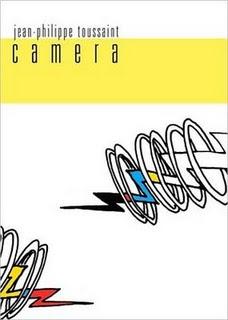Camera

Human beings are interested in two things. They are interested in the reality and interested in telling about it. – Gertrude Stein
Reality is an olive that rolls away to elude your fork. There are ways of dealing with this. Mashing flat the olive helps. When sitting in the john, consider chess moves by the Hungarian master, Gyula Breyer. Even if you’re a guy, pedicures are nice in the struggle with reality. Pap smears too (women only), but, ladies, the smear should be fresh. Don’t wait before mailing the tender Pap to the lab or the results are useless.
Love, incidentally, is a mournful, flu-like state, but when you are wrapped in each others’ arms at a London intersection, and it’s cold and you’re jumping up and down to stay warm, O!, love can be sweet.
All these things and many more of consuming interest you will learn from this risible, mournful, short novel by Jean-Philippe Toussaint, in which the nameless Parisian narrator falls for Pascale in an offhand, but quietly passionate way. Pascale runs a driving school, tends to be sleepy, and has a young son, Pierre, and a father whose hair is disheveled.
Camera has a plot, if you call learning to drive and buying a tank of propane and not having a dinner in an Indian restaurant, and spending a night thinking a plot. The trajectory of the action is mostly linear and forward, though there is a major flashback. And for about two-thirds of the journey you will chortle, as at this deadpan example, in which the narrator plays a one-armed bandit in a British pub.
The interior cylinder would spin around and come to a dead stop, showing an odd assortment of fruit, from which two eternal mauve prunes, ambivalent and testicle-shaped, recurrently appeared before me as an image of my fate.
Must one have ambivalent testicles to appreciate this drollery? I hope not.
Anyway, after much humour, tendresse, and sensibilité things, as I intimate above, turn Camusian. The narrator misses a train. He is forced to walk at night through an empty landscape. He assumes residence in a phone booth and ponders another world, one like ours, but without wounds and aggression and pain. He thinks about thought itself, which he has done previously, as in this astonishing passage.
A few minutes earlier, on the maritime platform, I had stopped to watch the rain fall in a bright projected beam, in the exact space delineated by the light, enclosed and yet as devoid of material borders as a quavering Rothko outline, and, imagining the rain falling at this place in the world, which, carried by gusts of wind, passed through my mind, moving from the shining cone of light to neighboring darkness without it being possible to determine the tangible limits between the light and shadows, rain seemed to me to represent the course of thought, transfixed for a second in the light and disappearing the very next second to give way to itself.
Doubtless you noticed how this sentence goes on, twisting and turning, picking up speed, slowing down, by means of a sprinkle of commas here and there so you don’t have to be constantly guessing at the punctuation, as you do, say, in Molly Bloom’s soliloquy in Ulysses, for example. Oh boy! you will expostulate. And wow! And yippee! Thank goodness for such sentences in Camera!
And thank goodness, you will add, for quotidian reality and its construction in this novel by means of those sinuous snaking sentences and thirteen-page-long paragraphs. Because, really, aren’t you tired of all the commercially inclined routine sentences and paragraphs that are all the same, whether it’s a John Grisham phantasy or any other airport novel, sentences that never take a chance, never take wing, paragraphs that are mere bites so the book pitches to a common denominator, and ergo make a zillion bucks for author and publisher, as though language were a commodity like pork bellies instead of an adventure? Gertrude Stein sure was. Tired of that kind of writing merde, I mean. She was. She was, and, I can tell you, I am too.
“Make it new,” Ezra Pound said. Maybe he should have said, “Make it novel.” Same thing, with pun intended. J-PT sure does. Of course you can’t have media-induced ADD to read Camera. Good. Separates the sheep from the readers. And Camera has ordinary sentences, too. Take that Cussler and Collins!
Anyway, dear friends, you who love the fresh, new, risky, and funny; the delightful, romantic, witty, and clever; the profound, rueful, hilarious, sad, lovely, plaintive, tongue-in-cheek, and complex; the mischievous and deadpan-as-Buster-Keaton; the socially conscious and anti-authoritarian—all good things—will cherish this delectable feast of a novel novel by the very French writer, Jean-Philippe Toussaint.
And yes, there is a camera.
And Matthew B. Smith’s translation is a blast of a blast.
And pass it on.
Great review--cheers!